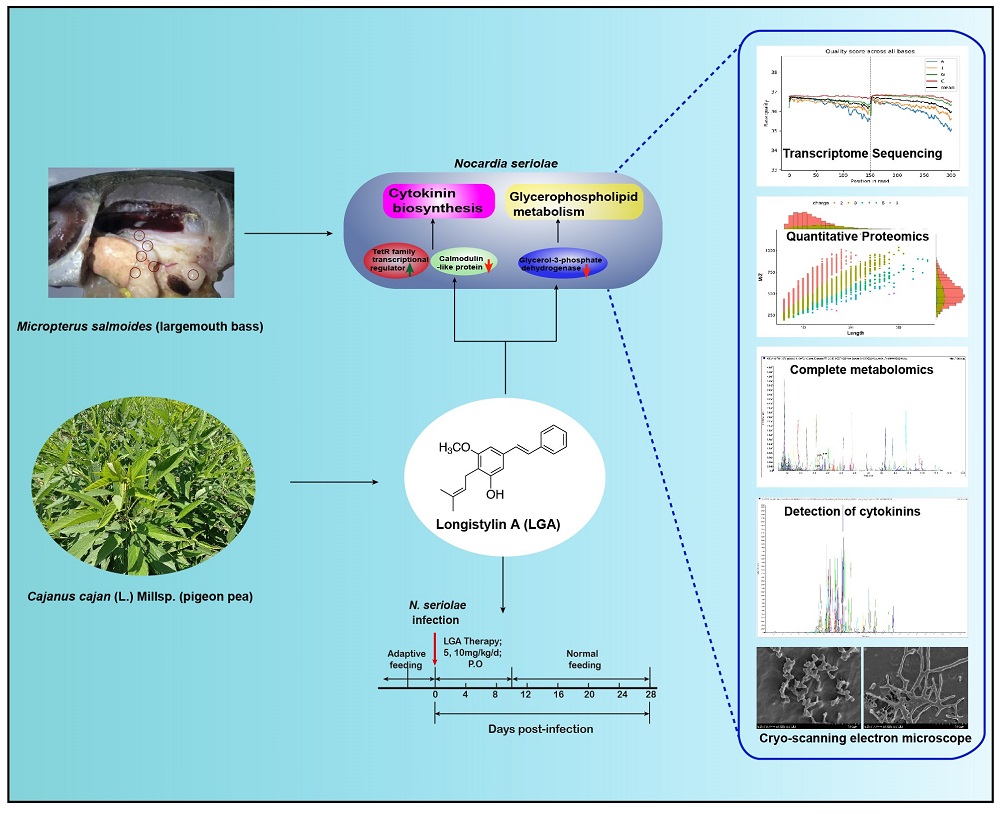Unraveling the Antimicrobial Potential: Pigeon Pea Stilbene Longistylin A against Nocardia Infections
A groundbreaking study by researchers from the South China Botanical Garden of the Chinese Academy of Sciences has shed light on the antimicrobial mechanisms of Longistylin A (LGA), a natural stilbene compound found in pigeon pea (Cajanus cajan (L.) Millsp.) leaves. This research, led by Professor Sheng-xiang Qiu, has been published in the Journal of Ethnopharmacology, focusing on LGA's ability to combat Nocardia seriolae, a challenging pathogen with similarities to tuberculosis.
LGA was isolated and its effects on Nocardia seriolae were investigated through a comprehensive approach involving transcriptomics, proteomics, metabolomics, cytokinin quantification, and cryo-scanning electron microscopy. The findings revealed that LGA disrupts glycerophospholipid metabolism and cytokinin biosynthesis, thereby exhibiting potent antibacterial properties. This discovery not only validates the traditional medicinal uses of pigeon pea leaves but also holds promise for the development of novel, targeted therapies against the growing global health concern of Nocardia infections.
Pigeon peas, a globally significant legume crop, are known for their nutritional value and medicinal properties. Prof. Qiu's team's research on the plant's bioactive compounds, particularly flavonoids and stilbenes, has expanded our understanding of their potential as natural antimicrobial agents. Their findings contribute to the scientific community's efforts to combat antibiotic-resistant infections and explore alternative sources of therapeutic compounds.
Full article links are as follows:
1. Zhao et al., Journal of Ethnopharmacology. 2024,15:118199.
https://doi.org/10.1016/j.jep.2024.118199 (Anti-Nocardia effects of Longistylin A from pigeon peas)
2. Yao et al., RSC advances, 2024,14, 7763-7769.
https://doi.org/10.1039/D3RA08149D (Discovery of four new stilbenes in pigeon peas)
3. Yao et al., Natural Product Research, 2024, 2:1-8.
https://doi.org/10.1080/14786419.2023.2297862 (Discovery of three new stilbene active components in pigeon peas)
4. Zhao et al., Antiviral Research, 2023, 212: 10557.
https://doi.org/10.1016/j.antiviral.2023.105570 (Antiviral mechanism of Pinostrobin from pigeon peas against coronaviruses)
5. Li et al., Journal of Agricultural and Food Chemistry, 2022,70: 15840-15847.
https://doi.org/10.1021/acs.jafc.2c07240 (Inhibitory Mechanism of PME from pigeon peas against Aspergillus flavus)
First author information: Liyun Zhao: Assistant Professor, Botanical Science Research Center, South China Botanical Garden, Chinese Academy of Science, Research Field: Antimicrobial Active Ingredients and Mechanisms of Action in Medicinal Plants, E-mail: zhaoly@scbg.ac.cn ; Tel :020-372082553.

File Download: